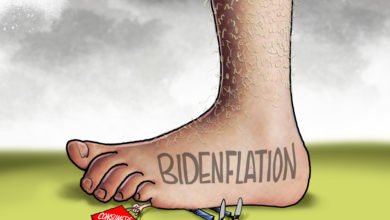$15 Minimum Wage Would Have Harsh Consequences for Ohio and West Virginia Workers, New Analysis Finds
A federal $15 minimum wage may have been taken out of Congress’s forthcoming COVID-19 legislation, but progressives haven’t abandoned the “Fight for $15”—not even close. Indeed, Senate Majority Leader Chuck Schumer insists that Democrats “are not going to give up the fight to raise the minimum wage to $15.”
This is bad news for workers everywhere. But according to a new study from the free-market Buckeye Institute, it’s particularly ominous for the hundreds of thousands of workers in low-income states like Ohio and West Virginia who could end up unemployed if a $15 nationwide minimum wage eventually gets forced through.
The Buckeye Institute used data from the nonpartisan Congressional Budget Office’s analysis of a federal $15 minimum wage and concluded that nearly 116,000 Ohioans and 18,000 West Virginians would end up unemployed as a result of the policy.
“While some individuals would benefit from a federally imposed minimum wage hike, many others—nearly 116,000 Ohioans—would suffer job loss,” the Buckeye Institute’s Logan Kolas said. “Thousands of Ohio’s small business owners—many who have been devastated by the pandemic—will be forced to cut jobs or be put out of business by this misguided attempt to forcibly raise wages. The result will be fewer jobs for Ohioans.”
Consistent Findings Show Perils of Minimum Wage Hikes
Make no mistake: This study’s finding is no outlier.
Basic economic theory reveals that minimum wage hikes cause unemployment, and the clear majority of empirical research illustrates this truth. The CBO estimates that a federal $15 minimum wage would destroy at least 1.4 million jobs, and this Ohio estimate is consistent with other state-level findings.
Why would a doubling of the federal minimum wage have such disastrous results? The answer has a lot to do with the perils of imposing one wage rate on the entire country.
The Folly of One Minimum Wage for Such a Vast and Diverse Country
Minimum wage increases always and inevitably cause unemployment. But a federal $15 minimum wage would lead to particularly sharp negative consequences. The reason is simple: America is a vast and diverse country with widely ranging levels of income and cost of living across 50 states, Washington DC, and 14 territories.
In some places, like New York City or Los Angeles, a $15 minimum wage wouldn’t have much impact; positive or negative. Why? Well, the cost of living and average wage there is already so high that a $15 minimum wage would hardly make a difference.
But if you adjust for cost of living and use Washington DC as your standard, a $15 federal minimum imposes an effective $68 hourly minimum wage in Puerto Rico. In Ohio it’s equivalent to a $21.60 minimum wage, and in West Virginia it’s equivalent to a $26.01 minimum wage.
So imposing one flat federal minimum wage rate means creating a massive labor shock in parts of the country where the cost of living is lower.
The Problem With One-Size-Fits-All Federal Policies
The minimum wage is just one example, but one-size-fits-all federal policies are almost always doomed to fail. Why?
It’s due to what Nobel-prize-winning economist Friedrich Hayek dubbed the “knowledge problem.” As Hayek explained, only those closest to a given situation have the relevant knowledge and awareness to make sensible, informed decisions with respect to that situation. So, centralized decision-making is doomed to failure, because it is detached from local knowledge.
“If we can agree that the economic problem of society is mainly one of rapid adaptation to changes in the particular circumstances of time and place,” Hayek famously wrote, “it would seem to follow that the ultimate decisions must be left to the people who are familiar with these circumstances, who know directly of the relevant changes and of the resources immediately available to meet them.”
When it comes to 50+ rapidly changing state labor markets across the country, suffice it to say that Washington bureaucrats are hardly the most informed parties. Workers, business owners, and localities can account far better for their local cost of living and average wage rates than federal government officials.
A one-size-fits-all federal minimum wage policy will inevitably hurt workers in like Ohio and West Virginia hardest. And frankly, there’s nothing “progressive” about leaving more Americans in lower-income states unemployed.
This article was originally published on FEE.org



